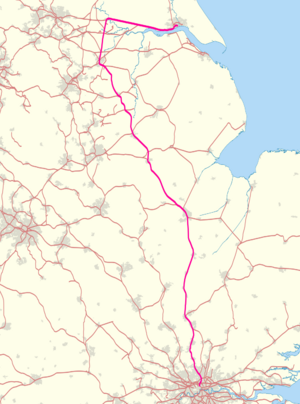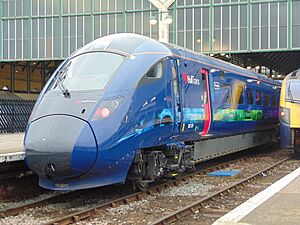Hull Trains facts for kids
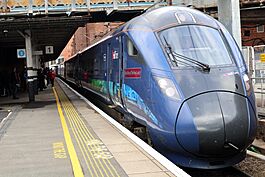
A Class 802 Paragon at Doncaster in February 2024
|
|||
| Info | |||
| Franchise(s): | Open access operator Not subject to franchising 25 September 2000 – December 2032 |
||
| Main (s): |
|
||
| Other (s): | East of England | ||
| Fleet size: | Class 802 Paragon | ||
| National Rail abbreviation: | HT | ||
| Parent company: | FirstGroup | ||
|
|||
Hull Trains is a special kind of train company in England. It's called an "open-access" operator. This means it runs its own train services without being part of a government-set franchise. Hull Trains is owned by a big transport company called FirstGroup.
This company runs long-distance passenger trains. These trains connect Hull Paragon and Beverley in Yorkshire to London King's Cross in London. Hull Trains has permission to use the railway tracks until December 2032.
Hull Trains started in 1999. Back then, not many trains went directly from Hull to London. So, some former railway managers decided to create a new service. They got permission to start running trains on 25 September 2000. Over the years, Hull Trains has extended its permission to use the tracks many times.
At first, Hull Trains ran three services each day. Because more and more people wanted to travel with them, they slowly added more trains. By December 2006, they were running seven services daily. They also made their trains longer to carry more passengers.
Hull Trains has used different types of trains over the years. They started with three-car Class 170 Turbostar diesel trains. Later, they used four-car Class 222 Pioneer trains, which could go faster. They also used five-car Class 180 Adelante trains and InterCity 125 sets. Since 2022, Hull Trains has been using a fleet of five Class 802 Paragon trains. These are "bi-mode" trains, meaning they can run on electricity or diesel.
During 2020 and 2021, Hull Trains had to stop its services a few times because of the COVID-19 pandemic. But regular services started again on 12 April 2021.
Contents
How Hull Trains Started
In 1999, there was only one direct train each day between Hull and London. This train was run by another company called GNER. Two former railway managers, Mike Jones and John Nelson, wanted to offer more trains. They teamed up with a company called GB Railways.
Getting Permission to Run Trains
In December 1999, Hull Trains got permission to use the railway tracks for four years. Other train companies tried to stop them, but Hull Trains had support from local politicians. Everyone wanted better train connections for Hull.
On 25 September 2000, Hull Trains ran its first service from King's Cross. Many people used the new service. However, soon after they started, a big train accident (the Hatfield rail crash) caused problems across the railway network. This meant trains had to go slower or lines were closed, which affected Hull Trains.
In its first year, Hull Trains carried about 80,000 passengers. In September 2002, their permission to use the tracks was extended for ten more years.
Changes in Ownership
In August 2003, a large transport company called FirstGroup bought GB Railways. This meant FirstGroup became the main owner of Hull Trains. In 2005, Hull Trains celebrated carrying its one-millionth passenger!
In June 2008, Hull Trains changed its name to First Hull Trains and started using FirstGroup's blue, pink, and white colours on its trains. Its track access rights were extended several times, first until December 2014, then until December 2016.
In August 2014, FirstGroup bought the rest of Hull Trains, making it fully owned by FirstGroup. In January 2015, the track access agreement was extended again until December 2019. That same year, the company went back to being called Hull Trains.
New Trains and Awards
In March 2016, Hull Trains got approval for another 10-year agreement, lasting until 2029. This allowed them to order five new Class 802 trains. These new trains were announced in September 2015.
In 2017, Hull Trains was named the Best UK Train Operator. This was based on a survey where 97% of passengers said they were happy with the service.
Impact of the Pandemic
In late March 2020, Hull Trains temporarily stopped all services because of the COVID-19 pandemic. There were worries the company might not survive without government help. However, Hull Trains was able to start services again on 21 August 2020. In October 2020, their access rights were extended for another three years.
Due to further lockdowns, Hull Trains had to suspend services again in November 2020 and January 2021. But regular services fully restarted on 12 April 2021. In August 2021, their track access agreement was extended until December 2032.
Train Routes and Stops
Hull Trains offers services between London King's Cross and Hull Paragon, and also to Beverley.
| Route | Trains per day | Stops Along the Way |
|---|---|---|
| London King's Cross to Hull Paragon | 5 |
|
| London King's Cross to Beverley | 2 |
|
Hull Trains started with three services daily in 2000. They gradually increased this to seven daily services by December 2006.
Since 2015, some services have been extended beyond Hull Paragon to Beverley. This gives more people access to direct trains to London.
Future Plans for New Routes
Hull Trains has looked into adding new routes over the years.
Plans for Cleethorpes
In 2001, Hull Trains thought about running a direct service from Cleethorpes to London King's Cross. This route would have stopped at several towns like Grimsby and Lincoln.
Plans for Harrogate and Sheffield
In 2008, they also applied to run services between Harrogate and London. However, this plan was not approved.
More recently, on 5 January 2024, Hull Trains announced a new plan. They applied to start a new service between London King's Cross and Sheffield. These trains would also stop at Woodhouse and Worksop. Hull Trains hopes to start this new service in the second half of 2025.
The Trains Hull Trains Uses
Current Trains: Class 802 Paragon
In September 2015, Hull Trains ordered five brand new "bi-mode" trains from Hitachi Rail. These trains cost £60 million and can seat 320 people. They are called Class 802. Hull Trains named their new fleet the 'Paragon' fleet. The first of these new trains started service on 5 December 2019.
Each Class 802 train has five carriages. Some carriages have standard seating, while others have first-class seating. There are also special areas for wheelchairs. These new trains do not have a cafe bar like some older trains did.
| Train Type | Class | Image | Power Type | Top Speed | Number of Trains | Carriages per Train | Routes Used On | Year Built | |
|---|---|---|---|---|---|---|---|---|---|
| mph | km/h | ||||||||
| Hitachi AT300 |
802 Paragon | 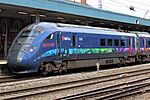 |
Bi-mode | 124 | 200 | 5 | 5 | Beverley / Hull Paragon – London King's Cross | 2017–20 |
| Train Number | Train Name |
|---|---|
| 802301 | Amy Johnson |
| 802302 | Jean Bishop (The Bee Lady) |
| 802303 | Land of Green Ginger |
| 802304 | William Wilberforce |
| 802305 | The Humber Bridge |
Past Trains Hull Trains Used
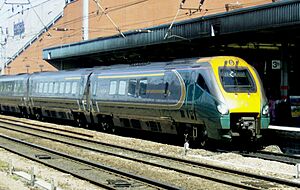
When Hull Trains first started, it was hard to find trains to use. They ended up leasing three-car Class 170 Turbostars trains. These trains began service on 25 September 2000.
Later, Hull Trains needed its own trains. They ordered four new three-car Class 170 trains, which started service in March 2004. These were a temporary solution. At the same time, they ordered four four-car Class 222 Pioneers trains.
The Class 222 Pioneers started service in May 2005. These trains were faster, allowing Hull Trains to increase its top speed from 100 to 125 mph (161 to 201 km/h). This made journeys quicker and helped the trains fit better with other high-speed services.
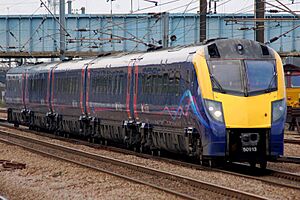
In April 2008, Hull Trains introduced five-car Class 180 Adelante trains. These trains offered more space for passengers. When they first arrived, they had some technical problems, but their reliability improved over time. The Class 180s were also updated inside with new seats and a fresh look.
In 2019, because of some reliability issues with the Class 180s, Hull Trains temporarily used InterCity 125 HST sets from another company. These were returned in December 2019.
After the new Class 802 trains arrived, the Class 180 trains were moved to another train company, East Midlands Railway, by summer 2020.
Where Trains Are Maintained
The older Class 180 trains used to be maintained at a depot called Old Oak Common. Each night, some trains were also serviced in Hull by Hull Trains staff. They would refuel the trains and empty the toilet tanks at Arriva Rail North's Botanic Gardens TMD.
Today, the new Class 802 trains are maintained by Hitachi at Bounds Green depot. They still get overnight servicing at Northern Trains' Hull Botanic Gardens TMD.


